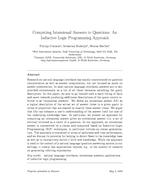Computing Intensional Answers to Questions - An Inductive Logic Programming Approach
Aus International Center for Computational Logic
Computing Intensional Answers to Questions - An Inductive Logic Programming Approach
Philipp CimianoPhilipp Cimiano, Sebastian RudolphSebastian Rudolph, Helena HartfielHelena Hartfiel
Philipp Cimiano, Sebastian Rudolph, Helena Hartfiel
Computing Intensional Answers to Questions - An Inductive Logic Programming Approach
Data & Knowledge Engineering, 69(3):261-278, March 2010
Computing Intensional Answers to Questions - An Inductive Logic Programming Approach
Data & Knowledge Engineering, 69(3):261-278, March 2010
- KurzfassungAbstract
Research on natural language interfaces has mainly concentrated on question interpretation as well as answer computation, but not focused as much on answer presentation. In most natural language interfaces, answers are in fact provided extensionally as a list of all those instances satisfying the query description. In this paper, we aim to go beyond such a mere listing of facts and move towards producing additional descriptions of the query results referred to as 'intensional answers'. We define an intensional answer (IA) as a logical description of the actual set of answer items to a given query in terms of properties that are shared by exactly these answer items. We argue that IAs can enhance a user's understanding of the answer itself but also of the underlying knowledge base. In particular, we present an approach for computing an intensional answer given an extensional answer (i.e. a set of entities) returned as a result of a question. In our approach, an intensional answer is represented by a clause and computed based on Inductive Logic Programming (ILP) techniques, in particular bottom-up clause generalization. The approach is evaluated in terms of usefulness and time performance, and we discuss its potential for helping to detect flaws in the knowledge base as well as to interactively enrich it with new knowledge. While the approach is used in the context of a natural language question answering system in our settings, it clearly has applications beyond, e.g. in the context of research on generating referring expressions. - Weitere Informationen unter:Further Information: Link
- Forschungsgruppe:Research Group: Computational LogicComputational Logic
@article{CRH2010,
author = {Philipp Cimiano and Sebastian Rudolph and Helena Hartfiel},
title = {Computing Intensional Answers to Questions - An Inductive Logic
Programming Approach},
journal = {Data \& Knowledge Engineering},
volume = {69},
number = {3},
publisher = {Elsevier},
year = {2010},
month = {March},
pages = {261-278},
doi = {10.1016/j.datak.2009.10.008}
}
